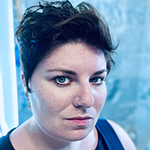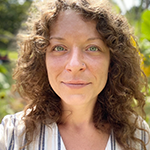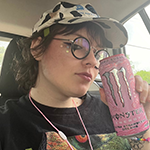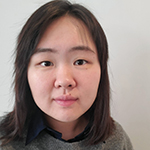Object Permanence
Entering my neighbor Evelyn’s home when she beckoned me in to play with her daughter felt like running into the crest of a wave. Maybe it was even more imposing, since the knickknacks and trinkets that flooded her house were not permeable like water, and they were piled so high over my small body that there was no clear path inside. The house reeked of oil paint. No windows were ever cracked. Hand-stretched canvases leaned against the counters and unfired clay sculptures were mounted in the corners of every room. Eggs dripped off the counters like the melting clocks in Dali’s, “The Persistence of Memory.” Gold busts of dignified-looking men were perched on top of garbage bags that swarmed with flies. Rotting fruit was arranged in meticulous, but long-forgotten still lives.
When I arrived, Evelyn would scream up the stairs without looking in my direction, “Your friend’s here!” In the time it took her daughter Nova to materialize, I would gorge myself on the scene in front of me. There were flowers from Evelyn’s wild garden that had dried up and died in handmade mosaic vases, brown petals scattered on the floor like broken acrylic nails. Magazines and junk mail heaped on the counters mingled with spoiled food in beautiful ceramic dishware. Teddy bears in sailor suits, Santa beards, and doctor’s scrubs clung to a crooked shelf on the wall. The baby dolls had missing limbs that Evelyn had plucked off for her mixed media sculptures, their eyelashes as delicate as the legs on the centipedes Nova and I collected from under the rocks in her backyard. Old cameras possessed film that spilled out like dragons’ tongues, lolling in tight curls that made me want to twist them around my fingers. Outside were large pieces of wood that Evelyn’s husband, who spent most of his time in the garage rehabbing old cars, would occasionally drill or hammer. This would always set off their mean little Jack Russell Terrier barking for hours.
If Nova failed to appear fast enough after I arrived, Evelyn would scream up the stairs a second time. “I said your friend’s here, you stupid bitch! Get down here and get your ass outside!” I wondered if Evelyn knew her dark nipples could be seen through her silk robe, which had become, by this point, its own kind of Jackson Pollock: a painter I wouldn’t become aware of until I was in college earning a degree in art. Sometimes my eyes settled on the little flecks of pigment in her hair, which was auburn and falling out of its butterfly clip. Despite my uneasiness in her presence, I wanted to be introduced to every iteration of her. If she was a Warhol painting, I wanted to know every individual box, every color, every version of who she once was.
When Nova finally rushed out of her room, she clutched the handrail until both sets of knuckles were white, and tried her best not to slide down the avalanche of objects on the staircase. Then, she carried me on her back out the door where we played horses. The trash littering the yard made the perfect hurdles—the dirt-caked tires, old Christmas trees—and I gripped onto her long, dark braid for reins. I played both jockey and judge, digging my calves and heels into her ribs as we soared. In rural Michigan, we didn’t have what my college friends in New York City would call “culture,” but we had imagination.
In elementary school art class, we studied the color wheel and contour lines and Vincent van Gogh, which is perhaps where I got the idea that mental illness is a prerequisite of being a successful artist. Never mind that van Gogh only sold a few paintings in his lifetime—that detail was lost on me as a child—and sometimes I wonder now how much poverty had to do with the nature of both his and Evelyn’s suffering. At twenty-five, I would be diagnosed with the same mental disorder as Van Gogh, but I couldn’t know that as I sat in art class trying to emulate his post-impressionistic style in my sunflowers and starry nights. I clutched my left ear in horror when I heard what he had done, but part of me understood the act, even then. After class, I brought my paintings to the fence between our yards when I saw Evelyn out gardening and asked for an honest critique. She told me the colors were dignified, but I needed to be braver in my brushstrokes. I gnawed on that word, agonizing over what it would mean to let a brushstroke communicate bravery.
*
When I was in middle school, Evelyn had a stroke that left her half-paralyzed. Word spread through the neighborhood like a chain of dominoes. My mother’s eyes grew large with concern when she received the phone call from the neighbor on the other side of Evelyn’s house; she barely spoke after the initial greeting. “Who is it?” I begged. A finger to her lips. “Is everything okay?” I asked again. A threatening look.
A ramp went up when she was in the hospital. Evelyn’s husband made it out of scrap wood. In her absence, a giant dumpster came to collect Evelyn’s treasures. Weeks passed, and when Evelyn returned, her ethereal mother moved in to care for her fulltime. On the rare occasion we crossed paths, Nova and I barely acknowledged each other. The four-year difference between us seemed much wider once she entered high school, but our separation was exacerbated by the fact I caught her peeking through her bedroom window into my bathroom one night as I was preparing to shower. I had been naked. My breasts, at twelve, were small as the green-husked, black walnuts Nova and I used to grip in our palms like fastpitch softballs to launch into the street under the tires of passing cars just to hear the pop. My hip bones jutted out—the result of an eating disorder to cope with my own family dysfunction—and my pubic hair was just emerging. When I sketched nude models with charcoal and red conte in college, I imagined an environment in which I felt safe enough in my body to drop my robe and let strangers translate me into two-dimensionality. What must those models have been thinking, I wondered: Italian noblewoman Lisa del Giocondo, the presumed muse for da Vinci’s “Mona Lisa?” Vermeer’s mysterious subject in “Girl with the Pearl Earring,” who may have been Sibyl, a prophetess in Ancient Greece, or a Biblical figure, or a nameless Dutch model whose identity will never be truly uncovered. Were they aware of their own beauty, their subtle sensuality? Did they trust the artist fully to capture their likeness with the tools they had at the time, or was likeness not what they were after? How I longed to know where their minds wandered during all those hours sitting for their portraits, and where their gazes fixed. On an object? On a thought?
I was never willingly the subject, but a woman had once knocked on the door of my childhood home and told my mother she could see directly through into my bedroom and suggested we get thicker curtains. Later, when I got my first apartment as an adult, I had a Peeping Tom within a few months of moving in. “Caught him staring up through your bedroom blinds last night,” my next-door neighbor had told me, and, when I had gone to investigate, I found forty cigarette butts dropped there in a halo.
In high school, I spent a lot of time readying my art to apply for college scholarships and peeking through the curtains out the window at Evelyn, who had leashed the Jack Russell Terrier to her wheelchair and screamed, “You little piece of shit!” at the dog when she pulled her off course. I also thought about Nova a lot. How she hadn’t darted her head back when she saw that I caught her staring at me. How it seemed like she wanted me to know she was looking. “That girl had absolutely nothing and she always still made something out of it,” my mother used to say of her. By then, she was barely around, and we were used to talking about Nova as though she existed in a different era. Memories of us swinging from my mother’s clothing line like the Olympic gymnasts we watched on her shoebox television set were getting fuzzier, as were the ones of us hiding for hours in the ice cream truck her father was supposedly fixing up to sell. We used to touch each other sometimes, as children do, hands perpetually in each other’s dirty hair, or massaging each other’s backs. Once, as an adult, I performed a Google search on repressed memories. There was something fluttering in my brain about being alone in that ice cream truck with Nova, and it was like a moth trapped against a window. I remembered cold steel against my back. Nova’s chapped lips in the dark as her gaze locked with mine. I remembered the freckles on her nose and cheeks. The beads of sweat on her temples that looked like tiny snow globes and the dirt caked under her fingernails. But the rest of my memory was as patchy as the grass we trampled daily in her backyard. Had we kissed? Had we done more than kiss? I closed the Google search when something startled me and never reopened it.
*
For one semester in college, I worked as an unpaid intern for artists in New York City in exchange for university credit. I lived in a Chelsea townhouse with twenty other aspiring artists. My roommate, Imani, was a lanky dancer, and our room was so small we couldn’t sit comfortably with our backs against the wall and stretch our feet to the other side. Neither of us particularly cared. I came to New York with, as Joan Didion wrote, the “youthful conviction that nothing like this… all evidence to the contrary notwithstanding, had ever happened to anyone before.” I had a new prescription for Xanax to cope with my panic attacks, largely exacerbated by my mother’s reaction to my coming out as gay. “You’ll be spit on, fired, assaulted,” she said. “No man will ever want you after this.”
One of my primary duties in New York was cleaning out a recently deceased artist’s studio and being part of the team to ship her work to museums all over the country. I was often criticized for my teenage naiveté or the way I was handling the art—“far too rough, you’ll create a crease in the paper!” I felt the spirit of the dead artist in every object I touched, and not just the art: the vintage kitchen supplies like the tongs and whisk dangling above her sink, the elevator buttons, the lock on the metal cage in her basement that housed an archive of her life’s work like a wild animal. It was exhausting labor, physically and emotionally, and even more so for her adult son, the artist for whom I was working. In teaching me how to process paintings, wrap them, divvy them up for sale, he was also processing his own grief. It showed in subtle ways: brief moments when his eyes appeared watery, silent breaks he would take to stare pensively out the window and crunch on dried seaweed. “Want some?” he would ask, and I would take it, smelling it curiously, glad he didn’t know what kind of cheap groceries I was buying to sustain myself in the most expensive place to live in the country.
One night, after eight hours sorting and shipping paintings, Imani persuaded me to accompany her to the club. Her boyfriend was in town visiting. On the subway, he commented, “It’s really a shame you’re a lesbian. What a fucking waste.” When we got to the club, I extended my arm for the iridescent wristband identifying me as under twenty-one. Imani, who was twenty-two, promised she would sneak me drinks, but I said I just wanted to dance. As it got later and the club got more crowded, bodies closed in on me. I felt hot breath on my neck. The club had various rooms and mirrors in which everything was distorted like a fun house. Someone had a bubble gun. I smelled something cotton candy-sweet. The flashing lights and fog machine made me feel both sleepy and too conscious at the same time. Then I saw Imani in the crowd. A wave of relief washed over me and I moved toward her.
Her eyes were closed, and she was swaying and grinding against muscular silhouettes. Men were touching and groping her as her boyfriend watched. He appeared to be too intoxicated to care, or maybe it turned him on. Imani’s sensual dancing and her body, which was draped in gold fabric, reminded me of the Gustav Klimt poster I’d purchased for fifteen dollars at the beginning of the semester and hung on our dorm room wall. The painting depicted on the poster was called “The Kiss.” Goldleaf (and silver, and platinum, in the case of “The Kiss”) was characteristic of Klimt’s “golden phase.” It came after a three-part series called the Vienna Ceiling that was ridiculed for being pornographic and perverted at the time, but to me just looked erotically powerful. When Imani opened her eyes and saw me approaching, she motioned for me to come forward. Pushing the men back, she grabbed onto both my hands and pulled me close to her. At first, the gesture seemed loving. I thought she was going to ask me a question. How are you doing? Do you want to go home? One hand cradled the back of my head, and her thumb made little circles in my hair. But then, she forced my mouth to hers. Her eyes stayed wide open. Her tongue shot into my mouth: a slimy, writhing thing. The men started hollering. I tried to pull away, but our bodies were locked together. The hand not pressing my head to hers was exploring me. Spit slipped down the side of my mouth. When I finally succeeded in tumbling backward, I stared at her in disbelief. She didn’t even meet my eyes. She was already back to dancing.
In our final weeks in New York City, Imani and I continued to live together in our tiny room, but we barely spoke. The night of the kiss, I stumbled home alone from the club and constructed a makeshift fort on the top bunk by hanging all my clothing from the pipes and piling all my belongings along the railings. I popped Xanax like Sweetarts. I got a teddy bear from MoMA with a t-shirt that said “Follow Your Art.” I bought costume jewelry on Sixth Ave and cheap trinkets in Chinatown and clothing at every thrift shop in Manhattan. I used money I didn’t have to pay for high-quality sketchpads for all my figure drawing classes and frames for all my photographs. My objects were a comfort when I piled them around me, these cheap little things. They were practically trash, as Duchamp’s “Fountain” was trash: a literal porcelain urinal he elevated to great art.
One of the last things Imani said to me, snapping her bubblegum and standing cross-armed in the doorframe to our dorm room, was, “How are you gonna’ get all that crap back to Michigan?”
“I’ll find a way,” I promised.
Back home for the summer, after all the boxes I had decided to ship had been delivered and my fifty-pound suitcase unpacked, I spent entire days in my basement darkroom. The paintings and photographs I had made in high school still hung on the walls, but while I was in New York, my parents had delegated everything of mine they no longer wished to see into the darkroom: sports trophies, the shoebox where I stored my pinhole photographs, the lamp I had made in sculpture class.
A year after returning home from New York, after I had graduated college early, I would have to leave all of those relics behind when I made the snap judgment to move in with my girlfriend and leave the house I was raised in. Home wasn’t safe and hadn’t been in a long time. My body shook every time my mother spoke to me, or through me. No amount of Xanax could make me still. I waited until my parents were at work. I packed only the objects that could fit into a garbage bag that I could not live without: my digital camera, my journals, a sketchpad, some clothing, my medication, a stuffed bear from childhood. I stopped at the bank and withdrew my entire savings from working throughout college. I drove straight to Ohio with no breaks.
From my girlfriend’s apartment, I thought about the abundance of objects the artist I worked for in New York had to sort through after his mother’s death. This was not my first period of estrangement from my own mother, and my grief for her was mixed in equal parts for all the material items I had to leave behind. I missed the inscriptions my friends had written in my high school yearbooks. I missed my novels. I missed the high school graduation cards from the people I worked with at the public library and the thick books of family photographs I convinced myself I may never see again. In a nuanced piece of writing about losing her best friend to suicide and having her heirloom jewelry stolen, author Sloane Crosley explores the idea that, “Grief is for people, not things,” and, squeezed on a twin bed with my girlfriend in Ohio, I worried that I had somehow gotten that all wrong.
But that would come later. Upon my arrival home from New York City, in the basement swimming with my knickknacks and art supplies, I could hear Evelyn’s muffled screaming at her Jack Russell Terrier outside. I stood on my tip toes to stare at her through the little window. Not much had changed since I had left. She was still half-paralyzed. The Jack Russell Terrier was still fat and mean, leashed to the top of her wheelchair. They both still meandered back and forth along the block like the Pirate ship boat ride at the county fair. For a brief second, I considered taking some of my artwork out to Evelyn to show her what I had created during the semester, as I had when I was a child after art class. I could ask for an honest critique. But I was still scared of her—her brashness, the way she could pop off, unprovoked, like a Roman candle, and the fact that one day, everything had changed for her. I was worried about what Evelyn would have to say about my gayness, and wondered if her daughter had come out too. Was that part of the reason I hadn’t seen her back home in months? Were Nova and I just two parallel lines living next door to each other our entire childhood: two girls with mothers who couldn’t see them properly?
In this imagined scenario—the one in which I brought a stack of my artwork out to Evelyn and placed it in her lap to inspect—I would watch through my fingers, heartbeat clearly audible in my eardrums. Maybe Evelyn would tell me she liked the wet-on-wet technique I had mastered in the watercolor paintings I had done my first week in the Big Apple. Perhaps she would say the way I had ground the charcoal into the paper during my figure drawing class was sophisticated, even though the proportions of the model’s body were off. Maybe she would say my photographs abided by the rule of thirds and possessed a certain chiaroscuro beauty—a playful dance of light and dark—and which was necessary in so many masterpieces throughout history. But I also feared she would say I still wasn’t brave enough, and that part of me would believe her.

Gabe Montesanti is the author of Brace for Impact: A Memoir (The Dial Press, 2022) and is currently at work on a second memoir. Keep up with her work on Instagram @gabemontesantiauthor or her website, gabemontesanti.com.

 BACK TO ISSUE
BACK TO ISSUE





